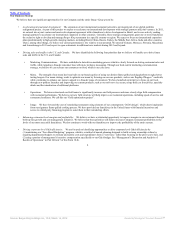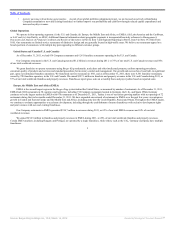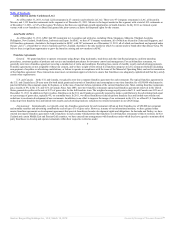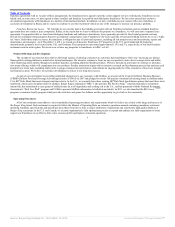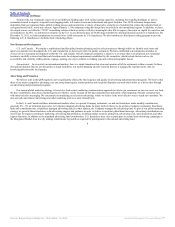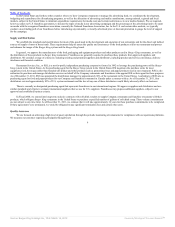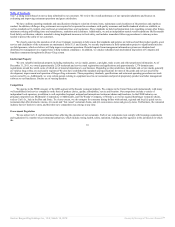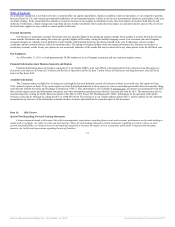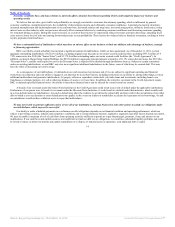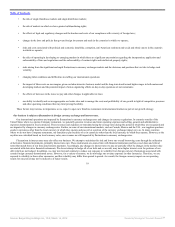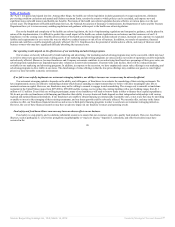Burger King 2011 Annual Report Download - page 15
Download and view the complete annual report
Please find page 15 of the 2011 Burger King annual report below. You can navigate through the pages in the report by either clicking on the pages listed below, or by using the keyword search tool below to find specific information within the annual report.
Table of Contents
Economic conditions have, and may continue to, adversely affect consumer discretionary spending which could negatively impact our business and
operating results.
We believe that our sales, guest traffic and profitability are strongly correlated to consumer discretionary spending, which is influenced by general
economic conditions, unemployment levels, the availability of discretionary income and, ultimately, consumer confidence. A protracted economic slowdown,
increased unemployment and underemployment of our customer base, decreased salaries and wage rates, increased energy prices, inflation, foreclosures, rising
interest rates or other industry-wide cost pressures adversely affect consumer behavior by weakening consumer confidence and decreasing consumer spending
for restaurant dining occasions. During the recent recession, as a result of these factors we experienced reduced revenues and sales deleverage, spreading fixed
costs across a lower level of sales and causing downward pressure on our profitability. These factors also reduced sales at franchise restaurants, resulting in lower
royalty payments from franchisees.
We have a substantial level of indebtedness which may have an adverse effect on our business or limit our ability to take advantage of business, strategic
or financing opportunities.
BKC, our wholly-owned subsidiary, has incurred a significant amount of indebtedness, which we have guaranteed. As of December 31, 2011, we had
aggregate outstanding indebtedness of $2,623.6 million, excluding original issue discount on our senior secured credit facilities, including $797.5 million of 9
7/8% senior notes due 2018 (the “Senior Notes”) and $1,779.8 million outstanding under our senior secured credit facilities (the “Credit Agreement”). In
addition, our parent, Burger King Capital Holdings, has $672.0 million in aggregate principal amount at maturity of 11.0% senior discount notes due 2019 (the
“Discount Notes”), and the cash required to service the Discount Notes is expected to be funded through distributions from us. Subject to certain restrictions
under our existing indebtedness, we and BKC may also incur significant additional indebtedness in the future, some of which may be secured debt. This may
have the effect of increasing our total leverage.
As a consequence of our indebtedness, (1) demands on our cash resources may increase and (2) we are subject to significant operating and financial
restrictions on us that may limit our ability to engage in acts that may be in our best interest, including restrictions on our ability to, among other things, (i) incur
additional indebtedness and guarantee indebtedness, (ii) prepay, redeem or repurchase certain debt, (iii) make loans and investments, including loans to our
franchisees or strategic partners, (iv) sell or otherwise dispose of assets or (v) incur liens. In addition, the restrictive covenants in the Credit Agreement require
BKC to maintain specified financial ratios. Our ability to meet those financial ratios can be affected by events beyond our control.
A breach of our covenants under the Senior Notes Indenture or the Credit Agreement could result in an event of default under the applicable indebtedness.
Furthermore, if our parent were to breach its covenants under the Discount Notes Indenture, it would result in a default under that indenture, which would result
in a cross-default under our indebtedness. Any such a default may allow the creditors to accelerate the related debt and may result in the acceleration of any other
debt to which a cross-acceleration or cross-default provision applies. In the event our lenders or noteholders accelerate the repayment of our borrowings, we and
our subsidiaries would not have sufficient assets to repay that indebtedness.
We may not be able to generate sufficient cash to service all of our indebtedness, and may be forced to take other actions to satisfy our obligations under
our indebtedness, which may not be successful.
Our ability to make scheduled payments on or refinance our debt obligations depends on our financial condition and operating performance, which are
subject to prevailing economic, industry and competitive conditions and to certain financial, business, legislative, regulatory and other factors beyond our control.
We may be unable to maintain a level of cash flows from operating activities sufficient to permit us to pay the principal, premium, if any, and interest on our
indebtedness. If our cash flows and capital resources are insufficient to fund our debt service obligations, we could face substantial liquidity problems and could
be forced to reduce or delay investments and capital expenditures or to dispose of material assets or operations, seek additional debt or equity
14
Source: Burger King Holdings Inc, 10-K, March 14, 2012 Powered by Morningstar® Document Research℠


